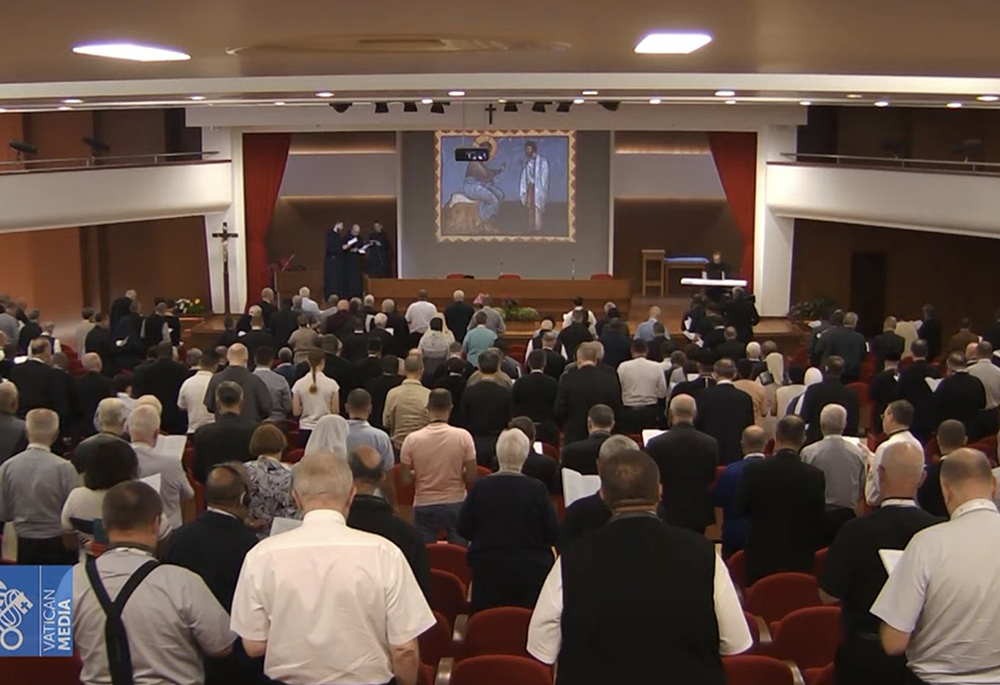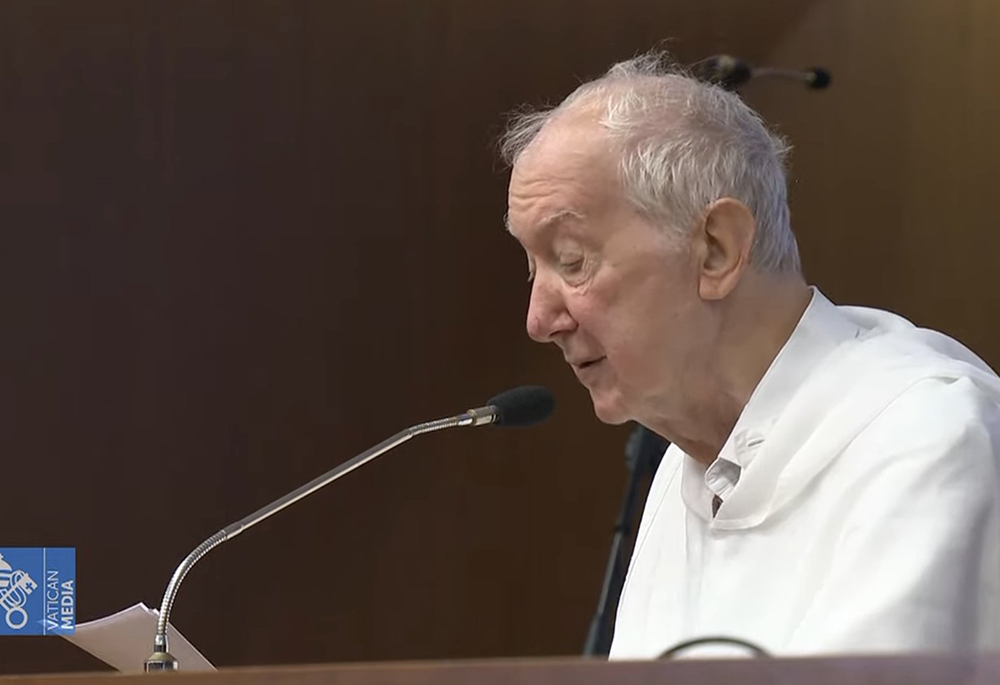
Members of the assembly of the Synod of Bishops recite morning prayer during their retreat outside of Rome in this screen grab from Oct. 2. (CNS/Vatican Media via YouTube)
In a first of its kind gathering, the more than 350 delegates from around the world that are participating in this month's Synod of Bishops are first meeting outside of Rome for a three-day retreat before returning to the Vatican for a high-stakes summit on the future of the Catholic Church.
The retreat is being led by a British theologian and former leader of the global Dominican Order, Fr. Timothy Radcliffe, at the personal invitation of Pope Francis. In his first four meditations, Radcliffe, 78, immediately addressed a number of the tensions surrounding the synod, using the Gospel's story of the transfiguration of Jesus to reflect on themes such as clericalism, the inclusion of LGBTQ Catholics, the role of women in the church and clergy sexual abuse.
Inside the room are a mix of laypeople and bishops that includes some of the synod's biggest critics and cheerleaders. Below are excerpts of what they are hearing:
How the Apostles acted after the Transfiguration:
"It does not always go well. They immediately fail to free the young lad from the evil spirit. They quarrel about who is the greatest. They misunderstand the Lord. But they are on their way with a fragile hope. So, we too prepare for our synod by going on retreat where, like the disciples, we learn to listen to the Lord. ... Let us ask the Lord to give us hope too: the hope that this synod will lead to a renewal of the church and not division; the hope that we shall draw closer to each other as brothers and sisters."
On the need for diversity, but not divisions:
"For many, [the synod] is the first time that the church has invited them to speak of their faith and hope. But some of us are afraid of this journey and of what lies ahead. Some hope that the church will be dramatically changed, that we shall take radical decisions, for example about the role of women in the church. Others are afraid of exactly these same changes and fear that they will only lead to division, even schism. Some of you would prefer not to be here at all. …
"When we listen to each other during the coming weeks and disagree, I pray we shall often say, 'Yes, and ...' rather than 'No'! That is the synodal way. Of course, 'No' is also sometimes necessary!"
On expectations and fears:
"Let us begin by praying that the Lord will free our hearts from fear. For some this is the fear of change and for others the fear that nothing will change. But, 'The only thing we have to fear is fear itself.' "

Dominican Fr. Timothy Radcliffe gives a meditation at the retreat outside of Rome for members of the assembly of the Synod of Bishops in this screen grab from Oct. 1. (CNS/Vatican Media via YouTube)
On the state of the world:
"We also gather in hope for humanity. The future looks grim. Ecological catastrophe threatens the destruction of our home. Wildfires and floods have devoured the world this summer. Small islands begin to disappear under the sea. Millions of people are on the road fleeing from poverty and violence. Hundreds have drowned in the Mediterranean not far from here. Many parents refuse to bring children into a world that appears doomed."
On disagreements and learning to listen:
"The greatest gifts will come from those with whom we disagree if we dare to listen to them. So, my brothers and sisters, we may be divided by different hopes. But if we listen to the Lord and to each other, seeking to understand his will for the church and the world, we shall be united in a hope that transcends our disagreements, and be touched by the one whom St. Augustine called that 'beauty so ancient and so new. … I tasted you and now hunger and thirst for you; you touched me, and I have burned for your peace.' "
On tensions between different visions of the church:
"Different understandings of the church as home tear us apart today. For some it is defined by its ancient traditions and devotions, its inherited structures and language, the church we have grown up with and love. It gives us a clear Christian identity. For others, the present church does not seem to be a safe home. It is experienced as exclusive, marginalizing many people: women, the divorced and remarried. For some it is too Western, too Eurocentric. …
"For some the idea of a universal welcome, in which everyone is accepted regardless of who they are, is felt as destructive of the church's identity. As in a 19th-century English song, 'If everybody is somebody then nobody is anybody.' They believe that identity demands boundaries. But for others, it is the very heart of the church's identity to be open."
On the marginalized, particularly LGBTQ people:
"James Allison [a theologian who frequently writes on LGBTQ issues] wrote: 'God is among us as one cast out.' Therefore, Jesus also suffered outside the city gate in order to sanctify the people by his blood. Let us therefore then go to him outside the camp and bear the abuse he endured."
On going out to the peripheries:
"Our lives are nourished by beloved traditions and devotions. If they are lost, we grieve. But also we must remember all those who do not yet feel at home in the church: women who feel that they are unrecognized in a patriarchy of old white men like me! People who feel that the church is too Western, too Latin, too colonial. We must journey towards a church in which they are no longer at the margin but in the center."
On clergy abuse:
"God remains in our church, even with all the corruption and abuse. We must therefore remain. But God is with us to lead us out into the wider open spaces of the kingdom. We need the church, our present home for all its weaknesses, but also to breathe the Spirit-filled oxygen of our future home without boundaries."
On heresy:
"Of course, not every hope or opinion is legitimate. But orthodoxy is spacious and heresy is narrow. The Lord leads his sheep out of the small enclosure of the sheepfold into the wide-open pastures of our faith. At Easter, he will lead them out of the small locked room into the unbounded vastness of God, 'God’s plenty.' "
On building friendships:
"We preach the Gospel by friendships that reach across boundaries. God reached across the division between Creator and creature. What impossible friendships can we make? When Blessed Pierre Claverie was ordained the bishop of Oran in Algeria in 1981, he said to his Muslim friends, 'I owe to you also what I am today. With you in learning Arabic, I learned above all to speak and understand the language of the heart.' …
"The foundation of all that we shall do in this synod should be the friendships we create. It does not look like much. It will not make headlines in the media. 'They came all the way to Rome to make friendships! What a waste!' But it is by friendship that we shall make the transition from 'I' to 'We.' "
Advertisement
On questions without answers:
"The bravest thing we can do in this synod is to be truthful about our doubts and questions with each other, the questions to which we have no clear answers. Then we shall draw near as fellow searchers, beggars for the truth. In Graham Greene's Don Quixote, a Spanish Catholic priest and a Communist mayor make a holiday together. One day they dare to share their doubts. The priest says, 'It is odd how sharing a sense of doubt can bring men together perhaps even more than sharing a faith. The believer will fight another believer over a shade of difference; the doubter fights only with himself.' …
"Friendship flourishes when we dare to share our doubts and seek the truth together. What is the point of talking to people who already know everything or who agree completely? But how are we to do so? That is the topic of the conference."
On listening:
"Many people hope that in this synod their voice will be heard. They feel ignored and voiceless. They are right. But we will only have a voice if we first listen. God calls to people by name: Abraham, Abraham; Moses; Samuel. They reply with the beautiful Hebrew word Hinneni, 'Here I am.' The foundation of our existence is that God addresses each of us by name, and we hear. Not the Cartesian 'I think therefore I am,' but 'I hear therefore I am.' We are here to listen to the Lord, and to each other."
On the model of Jesus heading to Emmaus:
"As the disciples walk to Emmaus, they listen to this stranger who calls them fools and contradicts them. He is angry too! But they begin to delight in his words. Their hearts burn within them. During the synod can we learn the ecstatic pleasure of disagreement leading to insight? …
"If we can discover the pleasure of imagining why our sisters and brothers hold views we find odd, then a new springtime will begin in the church. The Holy Spirit will give us the gift of speaking other languages.
"Notice that Jesus does not attempt to control the conversation. He asks what they are talking about; he goes where they go, not where he wishes to go; he accepts their hospitality. A real conversation cannot be controlled. One surrenders oneself to its direction. We cannot anticipate where it will take us, to Emmaus or Jerusalem. Where will this synod lead the church? If we knew in advance, there would be no point in having it! Let us be surprised!"
[Full videos of Dominican Fr. Timothy Radcliffe's reflections, which were presented in English, are available at the YouTube page of Vatican Media.]








